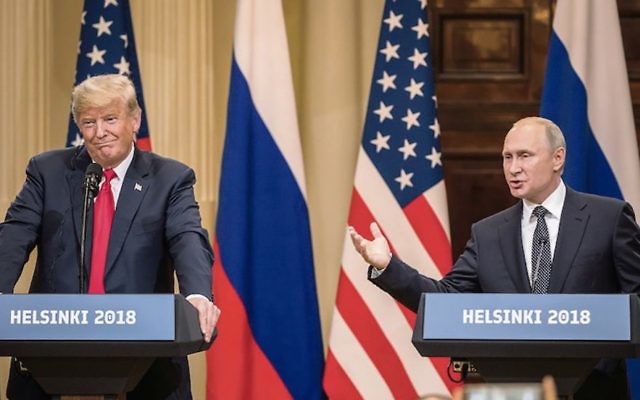Trump and Putin discuss Syria
In past discussions Trump has shown naivety about Russia’s seriousness about threats from Syria, and all indications after this week’s summit are that he is becoming less assertive, not more, with Putin.
THIS week’s Trump-Putin summit left one former CIA director convinced that his President is “wholly in the pocket of Putin.”
If this is right, Israel’s headache just intensified, and the border between Israel and Syria just got more vulnerable.
John Brennan, who headed the CIA from 2013 to 2017, captured what many Americans felt as they watched Donald Trump at his most sycophantic, during public appearances at their Helsinki meeting.
Trump boosted Putin’s international legitimacy by holding a one-on-one meeting with him, and flattered him in the press conference by refraining from criticising Russia.
Trump even undermined American intelligence agencies just as they have firmed up claims that Moscow interfered in the 2016 US election, by seeming to side with Putin who denies meddling (though he subsequently back-pedalled on this).
On the surface, it seems that Israel can relax, because as Americans debate whether Trump and Putin’s cosiness is good for US interests, Israeli interests seem taken care of.
Putin — an important player in Syria as he is helping the regime there — and Trump both say that they want to safeguard Israeli security, and if they have a good relationship, some conclude this could only help matters.
At the Trump-Putin conference, it seemed that the two men are not only friends, but part of a trio with Israeli Prime Minister Benjamin Netanyahu. Shortly afterwards Trump even referred to Putin as “a fan of Bibi.”
How does all of this translate in to the two countries having Israel’s back regarding Syria, meaning, ensuring that the Syrian regime doesn’t start breaking a 1974 agreement and putting troops on the border, and ensuring that it keeps Iranian forces far from Israel?
Trump said that “creating safety for Israel is something that both President Putin and I would like to see very much.”
Putin said that the south of Syria “should be brought to the full compliance” with the treaty of 1974, meaning that Syrian troops should be kept out of the buffer zone, a key demand of Netanyahu.
Netanyahu’s office quickly released a statement which says that he “commends the abiding commitment of the US and President Donald Trump to the security of Israel.”
Netanyahu “also very much appreciates the security coordination between Israel and Russia,” and Putin’s commitment to the treaty.
It all appears to be very reassuring for Israel. Except that it isn’t.
Israel’s biggest worry during the Syrian Civil War has never related to Syrian troops, but rather Iran. It wants to reduce the entrenchment of Iran, which has poured money and dispatched armies to Syria in order to save the regime.
For this, Israel needs a White House that is demanding Russia to use all of its power to root Iran out of Syria, preferably from the whole country but certainly in areas that are anywhere near to Israel.
Yes, Russia has made some of the right noises about making this change, but this isn’t happening in any satisfactory way.
In past discussions Trump has shown naivety about Russia’s seriousness about threats from Syria, and all indications after this week’s summit are that he is becoming less assertive, not more, with Putin.
It was good to see both Presidents committing themselves to Israel’s security in Helsinki this week, but Israel needed real outcomes, dealing with the concrete steps that will be taken to limit Iranian power in Syria.
It needed either to see these specifics delivered now or at least to see a glimpse of a US president who is willing and able to stand up to Putin and demand that he reins in Iran before it’s too late.
NATHAN JEFFAY


comments